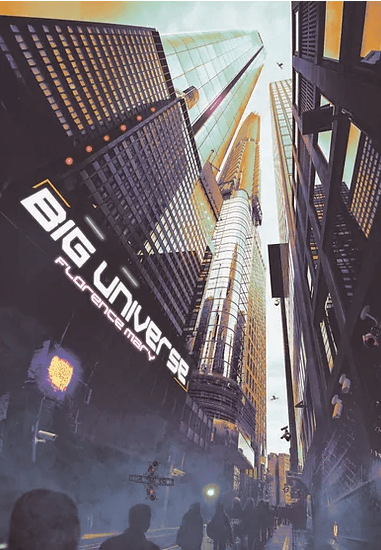In this post, I share a summary of the first novel I wrote, “Big Universe”. I won’t tell how it ends but explain a bit what the story’s about. Big Universe is a sci-fi (dystopia) book for an adult audience.
All my articles are available in French. If you’re learning French with the comprehensible input method, I highly recommend you to read the original French version to practice reading! I use accessible language and explain words or expressions that might be challenging for learners. If needed, go back to the English version for support. Please note the English version is not a literal translation.
Is this novel accessible to French learners?
It was written in French, which makes it a really good candidate to practice French reading! It’s always better to use books originally written in French, since translations into French are always influenced by the original language.
I think this book can be read by people with an intermediate level in French. Although it’s science-fiction, it not “hard science-fiction”, it doesn’t use a lot of technical vocabulary for example.
Some scifi genres, like “space opera”, use a lot of technical terms about space travel or spaceships. In hard scifi stories, where the story revolves around A.I. or bots, the vocabulary can also be quite challenging.
Big Universe is a dystopia. A dystopia is a story happening in a world where the authority have full control over the population, that ends up being exploited. Big Universe does use a few made-up words, since it’s happening in the future, but apart from that, the story is really accessible, and it’s mainly about human interactions and experiences.
If you can read the below summary and understand it globally (not necessarily word by word), I think you’ll also be able to read the novel. However, please note the novel was written with an adult audience in mind and contains some violent scenes, it should only be read by a mature audience.
Summary of Big Universe in French
Can you understand this book summary in French?
L’histoire se déroule dans le futur. Les autorités ont imposé un système de surveillance, “Big Universe”, qui filme tout le monde, partout, tout le temps. Les images sont diffusées sur une version futuriste de la télévision et tout le monde peut les regarder. Il n’y a donc plus de vie privée.
La plupart des gens se sont adaptés à ce mode de vie et en profitent parfois pour essayer de devenir célèbre, comme dans une téléréalité. D’ailleurs, il y a un classement des chaînes les plus populaires.
L’héroïne du livre ne se sent pas bien du tout dans ce système car elle angoisse à l ‘idée qu’on puisse l’observer à son insu. Elle fait tout pour passer inaperçue et qu’on ne s’intéresse pas à elle.
Malheureusement, elle finit par se faire remarquer malgré elle à cause d’une maladresse. Au même moment, des célébrités du classement commencent à être assassinées, alors que le système de surveillance Big Universe avait permis d’éliminer complètement la criminalité jusque-là.
L’héroïne va essayer de se faire oublier pour retomber dans l’anonymat, alors que les meurtres des personnalités du classement s’accélèrent et que le mystère plane sur l’identité des coupables.
Big Universe s’inspire du système “Big Brother” du roman “1984” de George Orwell, mais l’action se déroule à une époque complètement différente.
About the author and the editor
Check the French version of this post to read this section in French.
Big Universe was written by Florence Mary. It was first published in 2019, when she was 31. In 2024, the novel was published by another editor: La Lucarne Indécente.
Florence works in IT but has been writing since childhood. At school, she would write short stories during recess. As a teenager, she started blogging and hasn’t stopped yet. In her twenties, she started writing her first (unpublished) novel, then her second, “Big Universe”.
La Lucarne Indécente is a Belgian editor in Tournai. They publish novels in various genres (fantasy, science-fiction, thrillers…) with one common particularity: either their style or their story is breaking the usual codes of literature or delivering a strong message.

